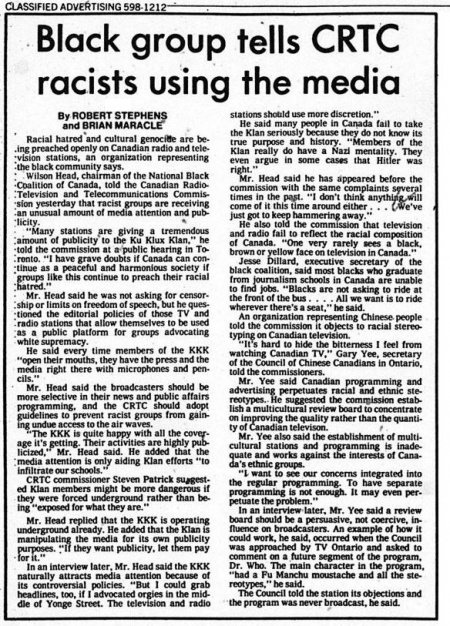Black group tells CRTC racists using the media
- Publication: The Globe and Mail
- Date: 1981-05-26
- Author: Robert Stephens and Brian Maracle
- Page: 63
- Language: English
Racial hatred and cultural genocide are being preached openly on Canadian radio and television stations, an organization representing the black community says.
Wilson Head, chairman of the National Black Coalition of Canada, told the Canadian Radio-Television and Telecommunications Commission yesterday that racist groups are receiving an unusual amount of media attention and publicity. "Many stations are giving a tremendous amount of publicity to the Ku Klux Klan," he told the commission at a public hearing in Toronto. "I have grave doubts if Canada can continue as a peaceful and harmonious society if groups like this continue to preach their racial hatred." Mr. Head said he was not asking for censorship or limits on freedom of speech, but he questioned the editorial policies of those TV and radio stations that allow themselves to be used as a public platform for groups advocating white supremacy.
He said every time members of the KKK "open their mouths, they have the press and the media right there with microphones and pencils." Mr. Head said the broadcasters should be more selective in their news and public affairs programming, and the CRTC should adopt guidelines to prevent racist groups from gaining undue access to the air waves. "The KKK is quite happy with all the coverage it's getting. Their activities are highly publicized," Mr. Head said. He added that the media attention is only aiding Klan efforts "to infiltrate our schools." CRTC commissioner Steven Patrick suggested Klan members might be more dangerous if they were forced underground rather than being "exposed for what they are." Mr. Head replied that the KKK is operating underground already. He added that the Klan is manipulating the media for its own publicity purposes. "If they want publicity, let them pay for it." In an interview later, Mr. Head said the KKK naturally attracts media attention because of its controversial policies. "But I could grab headlines, too, if I advocated orgies in the middle of Yonge Street. The television and radio stations should use more discretion." He said many people in Canada fail to take the Klan seriously because they do not know its true purpose and history. "Members of the Klan really do have a Nazi mentality. They even argue in some cases that Hitler was right." Mr. Head said he has appeared before the commission with the same complaints several times in the past. "I don't think anything will come of it this time around either . . . . We've just got to keep hammering away." He also told the commission that television and radio fail to reflect the racial composition of Canada. "One very rarely sees a black, brown or yellow face on television in Canada." Jesse Dillard, executive secretary of the black coalition, said most blacks who graduate from journalism schools in Canada are unable to find jobs. "Blacks are not asking to ride at the front of the bus . . . . All we want is to ride wherever there's a seat," he said.
An organization representing Chinese people told the commission it objects to racial stereotyping on Canadian television. "It's hard to hide the bitterness I feel from watching Canadian TV," Gary Yee, secretary of the Council of Chinese Canadians in Ontario, told the commissioners.
Mr. Yee said Canadian programming and advertising perpetuates racial and ethnic stereotypes. He suggested the commission establish a multicultural review board to concentrate on improving the quality rather than the quantity of Canadian televison.
Mr. Yee also said the establishment of multi cultural stations and programming is inadequate and works against the interests of Canada's ethnic groups. "I want to see our concerns integrated into the regular programming. To have separate programming is not enough. It may even perpetuate the problem." In an interview later, Mr. Yee said a review board should be a persuasive, not coercive, influence on broadcasters. An example of how it could work, he said, occurred when the Council was approached by TV Ontario and asked to comment on a future segment of the program, Dr. Who. The main character in the program, "had a Fu Manchu moustache and all the stereotypes," he said.
The Council told the station its objections and the program was never broadcast, he said.
Disclaimer: These citations are created on-the-fly using primitive parsing techniques. You should double-check all citations. Send feedback to whovian@cuttingsarchive.org
- APA 6th ed.: Maracle, Robert Stephens and Brian (1981-05-26). Black group tells CRTC racists using the media. The Globe and Mail p. 63.
- MLA 7th ed.: Maracle, Robert Stephens and Brian. "Black group tells CRTC racists using the media." The Globe and Mail [add city] 1981-05-26, 63. Print.
- Chicago 15th ed.: Maracle, Robert Stephens and Brian. "Black group tells CRTC racists using the media." The Globe and Mail, edition, sec., 1981-05-26
- Turabian: Maracle, Robert Stephens and Brian. "Black group tells CRTC racists using the media." The Globe and Mail, 1981-05-26, section, 63 edition.
- Wikipedia (this article): <ref>{{cite news| title=Black group tells CRTC racists using the media | url=http://cuttingsarchive.org/index.php/Black_group_tells_CRTC_racists_using_the_media | work=The Globe and Mail | pages=63 | date=1981-05-26 | via=Doctor Who Cuttings Archive | accessdate=1 September 2024 }}</ref>
- Wikipedia (this page): <ref>{{cite web | title=Black group tells CRTC racists using the media | url=http://cuttingsarchive.org/index.php/Black_group_tells_CRTC_racists_using_the_media | work=Doctor Who Cuttings Archive | accessdate=1 September 2024}}</ref>
